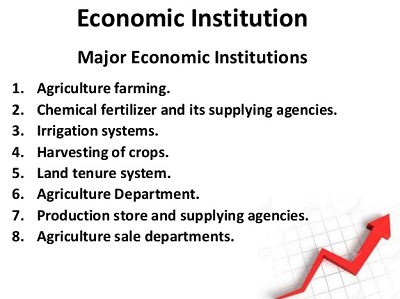Unit 4: Economic Institutions
Unit 4: Economic Institutions

Unit 4: Economic Institutions
 Unit 4: Economic Institutions
Unit 4: Economic Institutions
Economic institutions are the formal and informal rules, norms, organizations, and arrangements that govern economic activities within societies. They provide the framework within which individuals, businesses, and governments interact, make decisions, and allocate resources.
Key types of economic institutions include:
Property Rights: Property rights define the legal rights and ownership claims individuals or groups have over assets, resources, and property. Secure and enforceable property rights are essential for promoting investment, entrepreneurship, and economic development. They provide incentives for individuals to invest in and use resources efficiently.
Legal System: The legal system encompasses laws, regulations, and judicial institutions that govern economic transactions, contracts, and disputes. It provides a framework for enforcing property rights, resolving conflicts, and ensuring compliance with rules and regulations.
Financial Institutions: Financial institutions, including banks, credit unions, insurance companies, and capital markets, facilitate the flow of funds between savers and borrowers. They provide essential services such as savings, lending, investment, risk management, and payment systems, which support economic growth and stability.
Market Institutions: Market institutions include formal markets (e.g., stock exchanges, commodity markets) and informal markets (e.g., street vendors, flea markets) where buyers and sellers exchange goods and services. Market institutions play a vital role in determining prices, allocating resources, and coordinating economic activities through supply and demand interactions.
Government Institutions: Government institutions, including legislative bodies, regulatory agencies, and public administration, shape economic outcomes through policies, laws, and regulations. Governments provide public goods and services, enforce regulations, redistribute income, and intervene in markets to correct market failures, promote competition, and address social and environmental objectives.
Social Norms and Customs: Social norms, customs, and cultural practices influence economic behavior and decision-making by shaping attitudes, values, and expectations regarding work, entrepreneurship, saving, consumption, and cooperation. They play a significant role in determining economic outcomes, especially in areas such as labor markets, entrepreneurship, and social welfare.
Educational and Research Institutions: Educational institutions, including schools, universities, and vocational training programs, play a crucial role in developing human capital and skills necessary for economic participation and innovation. Research institutions and think tanks contribute to economic development by generating knowledge, analysis, and policy recommendations.
Economic institutions evolve over time in response to changes in technology, demographics, political systems, and societal values. They influence economic performance, inequality, and opportunities for individuals and businesses within societies. Understanding the role and functioning of economic institutions is essential for analyzing economic behavior, policy-making, and fostering inclusive and sustainable economic development.
Vocabulary
Lesson Reading
Videos and Interactives (Click on Images to View Content)

